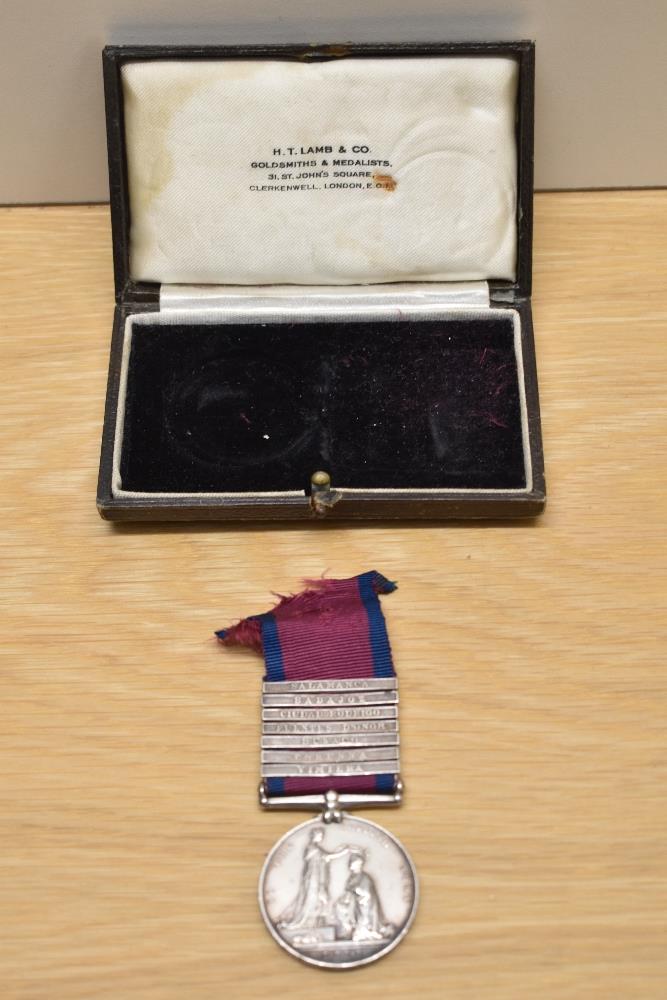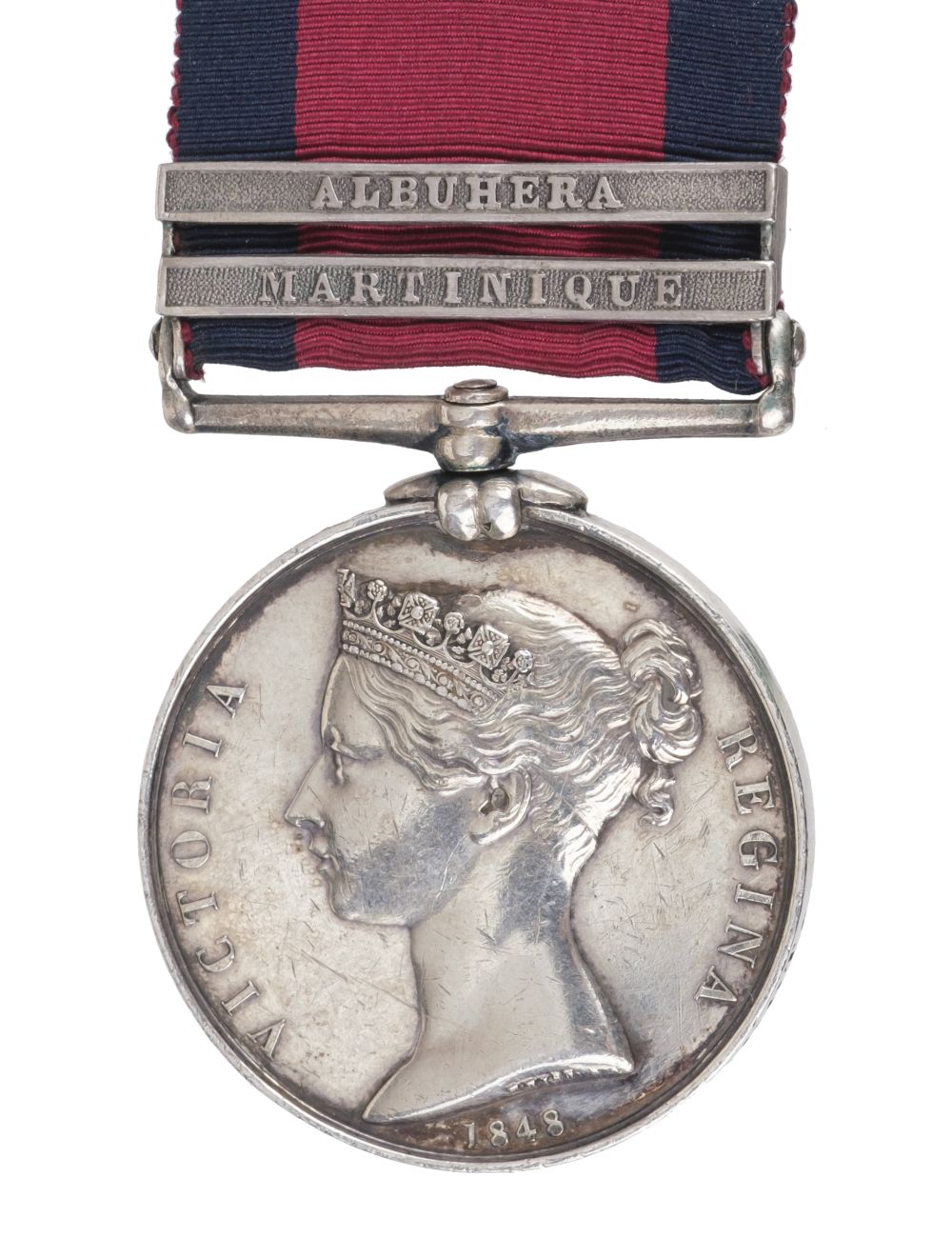The Military General Service Medal awarded to Private Abraham Neville of the 20th (East Devon) Regiment, who participated - and was wounded - in a celebrated bayonet charge during the defence of the Pass at Roncesvalles on 25 July 1813 Military General Service 1794-1814, 1 clasp, Vittoria (A. Neville, 20th Foot.), good very fine Abraham Neville (also spelt Nevell) was born in approximately 1786 in the parish of Horndley, Essex, and attested for the 20th (East Devon) Regiment of Foot on 1 April 1809, being placed in the company commanded by Captain George Tovey and with which he remained throughout his military service. Soon after Neville's joining, the 20th were embodied for service in the Walcheren Expedition and sailed aboard HMS Monmouth on 28th July that year. The expedition - which was unfortunately allocated more resources and troops than the force currently in the Iberian Peninsula under the command of the future Duke of Wellington - ended in almost complete failure some five months later. It is a well-known fact that 'Walcheren Fever' (a type of Malaria carried by mosquitoes that populated Holland's low-lying marshland during the summer months) killed more men than the opposing French forces: though the 20th were re-embarked for home on 6 September, upon their return they had about 600 men laid low in various military hospitals. Happily however, neither Tovey nor Neville seem to have been affected. Rest, Recuperation, and the Peninsula Desperate to allow its' soldiers a chance to recover from the debilitating effects of Malaria and additionally to recruit, the 20th were stationed in Ireland for almost two years - from July 1810 to October 1812 - before receiving orders for service in Portugal and Spain, landing at Lisbon on 15 November 1812 with a strength of 681 all ranks. From there the regiment, under the command of Colonel Robert Ross (later to be killed by an American sharpshooter at the Battle of North Point in 1814) moved up-country to join the Fusilier Brigade (comprising the 7th and 23rd Fusiliers) under overall command of Major-General Skerret. Though the Battle of Vitoria, on 21 June 1813, was a turning point in the Peninsular War the 20th saw little fighting - indeed, they only suffered five casualties. However, the regiment was to face a much sterner test a month later at the strategically-important Pass of Roncesvalles. Into the Pyrenees Wellington was quick to capitalise on his victory at Vitoria and swiftly laid siege to the town and fortress of San Sebastian, on the extreme north-eastern coast of Spain. However, the besieging force under Sir Thomas Graham had to be covered to prevent French forces from relieving the garrison; the 20th Foot found itself as part of the covering force stationed in and around that strategically-important mountain pass at Roncesvalles. The day before the action commenced, Maj-Gen Sir George Murray wrote to a fellow General Officer, Sir Lowry Cole: Lord Wellington has desired that I should express still more strongly how essential he considers it that the passes in front of Roncesvalles should be maintained to the utmost, and I am to direct therefore that you will be so good as to make every necessary arrangement for repelling effectually every direct attack that the enemy may make in that quarter. Bayonet Away! Bayonet Away! Over a series of narrow goat-tracks and mountain passes which sometimes only allowed for three or four men abreast, on 25 July 1813 French Marshal Nicolas Soult launched his army against the defending forces of British, Portuguese and Spanish troops: a Division under the command of Count Reille (some 17,000 men) advanced along a track that would take it directly into the path of the 20th Foot. By 11am on the 25 July, Reille's Division had been spotted and the Allies stood to their arms; spearheaded by skirmishers of the 6th Legere of Foy's Brigade, the 20th Foot - supported by Fusiliers of the 7th and 23rd - deployed to oppose them. The fire of these Fr
The Military General Service Medal awarded to Private Abraham Neville of the 20th (East Devon) Regiment, who participated - and was wounded - in a celebrated bayonet charge during the defence of the Pass at Roncesvalles on 25 July 1813 Military General Service 1794-1814, 1 clasp, Vittoria (A. Neville, 20th Foot.), good very fine Abraham Neville (also spelt Nevell) was born in approximately 1786 in the parish of Horndley, Essex, and attested for the 20th (East Devon) Regiment of Foot on 1 April 1809, being placed in the company commanded by Captain George Tovey and with which he remained throughout his military service. Soon after Neville's joining, the 20th were embodied for service in the Walcheren Expedition and sailed aboard HMS Monmouth on 28th July that year. The expedition - which was unfortunately allocated more resources and troops than the force currently in the Iberian Peninsula under the command of the future Duke of Wellington - ended in almost complete failure some five months later. It is a well-known fact that 'Walcheren Fever' (a type of Malaria carried by mosquitoes that populated Holland's low-lying marshland during the summer months) killed more men than the opposing French forces: though the 20th were re-embarked for home on 6 September, upon their return they had about 600 men laid low in various military hospitals. Happily however, neither Tovey nor Neville seem to have been affected. Rest, Recuperation, and the Peninsula Desperate to allow its' soldiers a chance to recover from the debilitating effects of Malaria and additionally to recruit, the 20th were stationed in Ireland for almost two years - from July 1810 to October 1812 - before receiving orders for service in Portugal and Spain, landing at Lisbon on 15 November 1812 with a strength of 681 all ranks. From there the regiment, under the command of Colonel Robert Ross (later to be killed by an American sharpshooter at the Battle of North Point in 1814) moved up-country to join the Fusilier Brigade (comprising the 7th and 23rd Fusiliers) under overall command of Major-General Skerret. Though the Battle of Vitoria, on 21 June 1813, was a turning point in the Peninsular War the 20th saw little fighting - indeed, they only suffered five casualties. However, the regiment was to face a much sterner test a month later at the strategically-important Pass of Roncesvalles. Into the Pyrenees Wellington was quick to capitalise on his victory at Vitoria and swiftly laid siege to the town and fortress of San Sebastian, on the extreme north-eastern coast of Spain. However, the besieging force under Sir Thomas Graham had to be covered to prevent French forces from relieving the garrison; the 20th Foot found itself as part of the covering force stationed in and around that strategically-important mountain pass at Roncesvalles. The day before the action commenced, Maj-Gen Sir George Murray wrote to a fellow General Officer, Sir Lowry Cole: Lord Wellington has desired that I should express still more strongly how essential he considers it that the passes in front of Roncesvalles should be maintained to the utmost, and I am to direct therefore that you will be so good as to make every necessary arrangement for repelling effectually every direct attack that the enemy may make in that quarter. Bayonet Away! Bayonet Away! Over a series of narrow goat-tracks and mountain passes which sometimes only allowed for three or four men abreast, on 25 July 1813 French Marshal Nicolas Soult launched his army against the defending forces of British, Portuguese and Spanish troops: a Division under the command of Count Reille (some 17,000 men) advanced along a track that would take it directly into the path of the 20th Foot. By 11am on the 25 July, Reille's Division had been spotted and the Allies stood to their arms; spearheaded by skirmishers of the 6th Legere of Foy's Brigade, the 20th Foot - supported by Fusiliers of the 7th and 23rd - deployed to oppose them. The fire of these Fr















Testen Sie LotSearch und seine Premium-Features 7 Tage - ohne Kosten!
Lassen Sie sich automatisch über neue Objekte in kommenden Auktionen benachrichtigen.
Suchauftrag anlegen